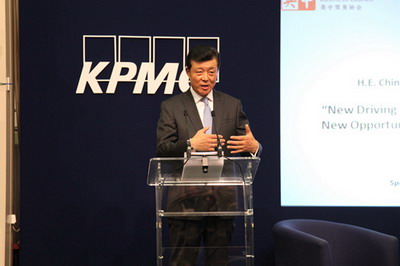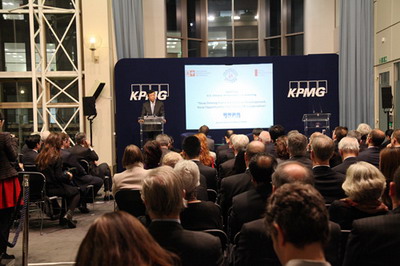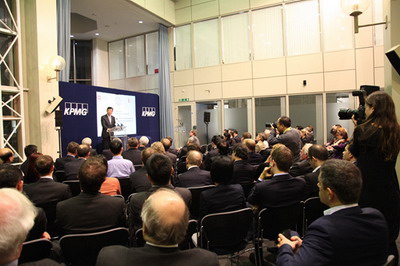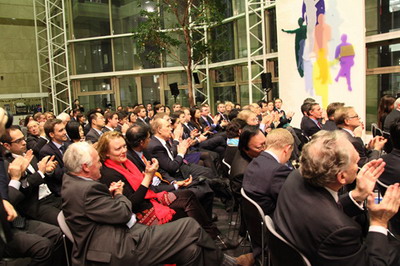|

(18 December 2013, KPMG Building)
Lord Howell,
Chairman Peter Batey,
Ladies and Gentlemen,
Dear Friends,
I want to thank the China-Britain Business Council, the 48 Group Club, the Great Britain-China Centre and KPMG for organizing this event.
All your organizations have long been friends of China, supporters of China's development and active players in China-UK cooperation. I salute you for your contribution to China-UK relations!
Given your keen interest in China, I am sure you have read about an 'important meeting' in China not long ago! This was, of course, the Third Plenum of the 18th Central Committee of the Communist Part of China.
The Third Plenum produced a document titled: 'The Decision of the CPC Central Committee on Major Issues Concerning Comprehensively Deepening Reform and Opening Up.' For convenience I will refer to this document as 'The Decision.'
Last month soon after the publication of The Decision, I was invited to give a speech at the Reform Club. In that speech I stressed that The Decision demonstrated China's strong determination, top-down design and overall deployment in continuing reform.
It happens that determination, design and deployment all start with letter D. In turn, that enables what I call a 3D, or three dimensional analysis of The Decision.
Most recently, I went back to China to accompany Prime Minister David Cameron on his visit.
I was greatly inspired by President Xi Jinping, Premier Li Keqiang and NPC Chairman Zhang Dejiang after listening to their comments on the Decision in meetings with Prime Minister David Cameron. As a result I would like to take this opportunity to share with you my thinking of the importance of the Decision and its implications for China-UK relations.
The Decision is a prospectus of China's future reform and opening up. It is a master plan for comprehensively deepening reform. In my view, the key to grasp The Decision is to understand the meaning of 'comprehensively' and 'deepening'.
'Comprehensively' means the reform is clear in aim and extensive in content. While sorting out priorities, The Decision is both general and specific.
The Decision states clearly the general goal:
· This is to improve and develop a socialist system with Chinese characteristics;
· And modernize government systems and governance capacity.
China's reform will not be limited to one field or one aspect. Instead, The Decision is a panorama of systemic, integrated and synchronized reforms. It requires reform measures to be mutually enhancing and facilitating. Such a synergy will help achieve breakthroughs in key areas while ensuring overall progress.
In terms of specific targets, The Decision is a five-in-one guideline. It aims to:
· Gear up the development of the socialist market economy.
· Advance democracy.
· Promote cultural development.
· Build a harmonious society.
· And protect the environment.
It also covers national defense and institutional building of the Party.
Pointing out the reform direction for each of these seven aspects and answering the call for reform from various social sectors, The Decision has set out more than 300 reform measures to achieve 55 main tasks in 15 areas. The magnitude of the reform is without precedent.
The reforms will be both sweeping and focused.
Economic reform is the centre piece. Economic reform measures account for over half of all the tasks. This is because problems facing China now all point to development. Ensuring sustainable and healthy economic development is a top priority for China. Successful economic reform will become the locomotive driving forward reform in other sectors.
The reforms cover both big and smaller issues. On the large size, examples are improving macro-control which mainly concerns the government. At the other end of the scale there are matters of immediate concern to every household, such as stopping the division of science and humanities in secondary education. Also of concern for families with children there is the issue of deleting foreign language from the list of compulsory subjects in the national college entrance examination.
Let me now turn to the definition of 'deepening' reform.
The reforms laid out in the Decision are built on China's reform in the past thirty five years. 'Deepening' means a further exploration and new breakthrough.
You will all know Deng Xiaoping famously compared China's reform to 'cross the river by feeling the stones'. At present, China's reform has entered the 'deep water' of that river.
As President Xi Jinping metaphorically said:
"All the tender meat has been eaten up. What's left now are hard bones."
Therefore, the Decision states that the government will mobilize all resources to meet the challenges and take on difficulties. We will discard outdated mindsets and break vested interests.
China needs to be bold in thinking to deepen reform.
For example, the Decision has for the first time made clear that the market will play a decisive role in resources allocation. The Decision sets out a raft of major economic reform measures in line with this principle. This is a monumental and historical breakthrough in theory in the course of China's reform and opening up.
As you all know prior to reform and opening up, China practiced a planned economy that was highly centralized. The role of the market was denied and suppressed. In the early days of reform and opening up, China realized that the market is compatible with socialism. Both planning and the market are means to grow an economy. We then went on to confirm that the market played a basic role in allocating resources.
Now, China is focusing on properly handling the relationship between the government and the market, which is the crux of economic reform. This means China will both let the market play a decisive role in resources allocation and better play the role of the government. We will improve the market system, reduce government intervention and address inadequate regulation.
I believe this approach will inspire open thinking. It will tackle the issues holding back the advance of China at the root:
· This will unleash the potential and originality of all market players.
· It will speed up China's economic transformation and upgrading
· It will build an efficient and clean government that truly serves the people.
· Above all, it will help foster a new and open economy.
Of course, the decisive role of the market does not mean that the role of the government will be weakened or negated. The Decision clearly defined the function and role of the government:
· Macro control.
· Public services.
· Market regulation.
· Social management.
· And environmental protection.

To deepen reform, we need to start from systems and institutions.
For example, the reform of fiscal and taxation system:
· The current system is inconsistent with the changed division of powers between the central and local governments.
· It is inadequate to meet the requirements for better governance.
· It is incompatible to the needs of economic transformation and promoting sustainable and healthy economic and social development.
Therefore, The Decision says the following:
· China should improve its budget management system
· Improve its taxation regime.
· And put in place a system corresponding to the division of administrative power and financial power.
The result is to give the central government more administrative powers and financial responsibilities. That means the following will all be the responsibility of the central government:
· National defense.
· Foreign affairs.
· National security.
· And national rules on market regulation.
Other sectors will be shared by the central and local governments. These will include:
· Powers over social security.
· And construction and maintenance of large cross-regional projects.
Regional public services will be in the portfolio of local governments.
This clearer and more reasonable division of administrative and financial powers will win the support of both central and local governments.
In China the general public care most about social security reform. In this area the Decision stresses the need to establish a fairer and more sustainable social security system. The pension schemes of government institutions will be reformed. The aim is to address public concerns over 'dual track' pension schemes. Moreover, basic old age insurance and medical care for urban and rural population will be integrated. There will also be a gradual extension of the retirement age.
So, we have every reason to conclude that the Third Plenum has drawn up a new blueprint for China. The Decision has set out new targets for comprehensively deepening reform in China.
Through reform, the Decision has unleashed the potential and added a new driving force for China's future growth. It has also laid a solid theoretical and institutional foundation for the realization of the Chinese Dream.
Dear Friends,
The Third Plenum is not only a new powerhouse for China's future development. It also creates new opportunities for China-UK cooperation. This is the consensus of the leaders of our two countries. The opportunities are clear to see.
Specifically, I believe the Decision has opened ten new opportunities for China-UK cooperation.
First, market access.
The Decision provides for uniform market access. On the basis of the 'negative list', all market players have equal access to sectors out of the list in accordance with law. An approach that combines pre-establishment national treatment and 'negatives' will be adopted towards foreign investments.
The Decision further clarifies that China will open up in an orderly manner these sectors:
Financial.
Educational.
Cultural.
Medical and other services sectors.
China will lift restrictions on foreign investments in these areas:
Child care.
Old age support.
Construction design.
Accounting and auditing.
And logistics and e-commerce.
The general manufacturing sector will also be further opened up. In a word, the Chinese market will be more open, fair and transparent.
Second, two-way investment.
The Decision aims to harmonize laws governing foreign and domestic investments. The changes will aim to maintain a stable, transparent and predictable policy environment for foreign investment.
The Decision also underlines the need to deepen reform in the investment system in the following way:
· Expand outbound corporate and individual investments.
· Recognize their status as investors.
· Allow and encourage innovative outbound investments such as green land investment, mergers and acquisition, securities and joint investment, etc.
On top of these legal changes, China will negotiate and sign investment agreements with countries and regions concerned. Without doubt, there will be a new wave of mutual investment between China and UK.
Third, free trade agreements.
The Decision says China will accelerate development of free trade zones. This will lead to:
· Reform of rules of market access.
· And revised customs, inspection and quarantine regulations.
There will be a speeding up of negotiations on these new topics:
· Environmental protection.
· Investment protection.
· Government procurement.
· E-commerce.
All these are intended to build a network of high quality free trade zones reaching out to the whole world.
China and EU are the largest trading partners to one another. We appreciate Prime Minister David Cameron's statement on his China visit that he will help push through a China-EU free trade agreement.
We hope that our two countries will use Prime Minister Cameron's visit as an opportunity to start related consultations at an early date, increase coordination in backing free trade and working together to pull off the plan.
Fourth, financial cooperation.
According to the Decision China will take steps to:
· Improve the financial market system.
· Further open up the financial sector.
· Encourage financial innovation.
· Build a multi-tiered financial market.
· Introduce more financial products.
· Work for mutual openness of capital markets.
· Increase the convertibility of cross-border capital and financial transactions.
· And make the RMB convertible under capital account.
I believe with the impetus of the Third Plenum, London will take faster steps in becoming an off-shore centre for RMB business. This means our financial corporations will benefit more from increased business and exchange.
Fifth, innovation in science and technology.
The Decision aims to deepen reform in science and technology system, set up innovation models that join the industry, universities and research institutions, foreground enterprises in technological innovation and build a national innovation system. In particular, it stresses:
· Strengthening the use and protection of intellectual property rights.
· Improving the incentive measures for scientific innovation.
· And exploring setting up an IPR court.
During Prime Minister Cameron's visit, China and UK signed the MOU on a 200 million pounds innovation fund. The objective is to support joint R&D projects of our companies and scientific research institutions.
On IPR protection, Premier Li Keqiang made clear to Prime Minister Cameron that China's economic transformation has come to a critical juncture. Scientific innovation is essential to economic transformation and upgrading.
But in the absence of effective IPR protection, it will be a serious challenge to motivate enthusiasm for innovation from our universities or businesses.
Following this trend, the Chinese government has recently decided to disclose penalties administered to all cases of IPR infringement. Those infringing companies and individuals will pay serious penalties for their wrong doing. This fully demonstrates the firm resolve and credible actions of the Chinese government to protect IPR.

Sixth, stronger spending ability.
The Decision aims at reasonable and orderly incomes distribution. China will increase the income of low earners. In turn this will enlarge the middle class and so bridge the income gap between rural and urban areas. The same policies will aim to reduce income differentials between regions and between different sectors. This means all Chinese will have more money to spend on quality imports, overseas traveling and shopping.
Seventh, development of central and western China.
The Decision calls for further opening up of border areas in China's hinterland. The objective is to promote coordinated development in trade, investment and technological innovation in these areas.
China will innovate models of processing trade. It will create institutions that help form industrial clusters in the western parts of China. It will support more cargo flights to and from interior cities.
In fact Britain has taken a very visionary step by opening direct flights between London and Chengdu. Britain will also soon open a consulate-general in Wuhan. While accompanying Prime Minister David Cameron on his visit to Chengdu, I witnessed the speed and scale of development in China's western regions. I also felt strongly the ample space for future China-UK co-operation this provides.
Eighth, cultural and people-to-people exchanges.
The Decision says China will increase openness in the cultural sector. The effect will be to:
· Broaden cultural exchanges with foreign countries.
· Foster export-oriented businesses in the cultural sector and support their efforts to explore overseas markets.
· Encourage social organizations and Chinese companies to take part in programs like the Confucius Institutes, Chinese Culture Centers, and to undertake cultural exchange projects.
· And China will draw on the finest of foreign cultures, attracting talent, technologies and expertise.
I believe all these will inject new dynamism into the China-UK cultural and people-to-people exchanges. Just this month, China and UK have signed the agreement on cultural exchanges for the coming five years.
Ninth, urbanization.
The Decision reiterates that China should pioneer a new path of urbanization that puts people first. It means we will:
· Promote coordinated development of cities and towns of different sizes.
· Strike a balance between industrial and urban development.
· And improve urban planning and management.
Britain has a wealth of experience in reviving old industrial cities and developing eco-friendly small towns. You also have mature institutions and regimes in urban planning. For all these reasons, China and UK have great cooperation potential in urbanization.
Tenth, medical and health care.
The Decision confirms that China will advance important reforms in these areas:
· Medical insurance.
· Medical care.
· Public health.
· Pharmaceuticals.
· And medical regulation.
During Prime Minister Cameron's China visit, health authorities of our two countries signed an MOU on health cooperation. It is aimed to strengthen bilateral cooperation in health sector and boost the quality of China's medical care. Moreover, the two sides also signed four commercial contracts on medical business with a combined value of over 150 million pounds. This shows that medical and health care cooperation will be a new growth area in China-UK cooperation.
Ladies and Gentlemen,
The Third Plenum marks a new starting point for China.
At the same time, the meeting of our national leaders set sail on a new voyage of China-UK relationship.
As an old Chinese saying goes:
'An opportune moment shall not be missed; a good opportunity shall not be wasted.'
I hope our British friends, whatever sector you are from, will not miss the moment or waste the opportunity.
I hope you will actively expand exchanges and cooperation with China in all fields.
There are immense mutual gains if you ride on the train of China's comprehensively deepening reform.
I am sure both countries will enjoy win-win from China's continuous growth.
Let us work together for a better future of China-UK relations.
Thank you. I would be glad to take your questions.

|

